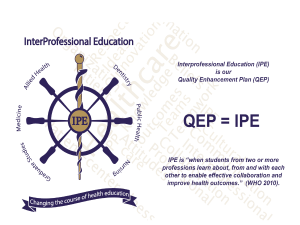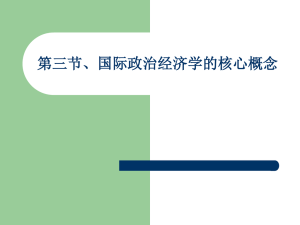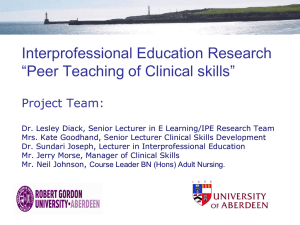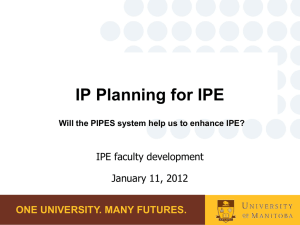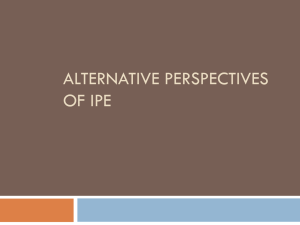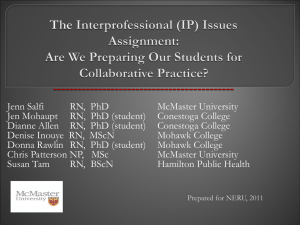The First World War - James Ashley Morrison
advertisement
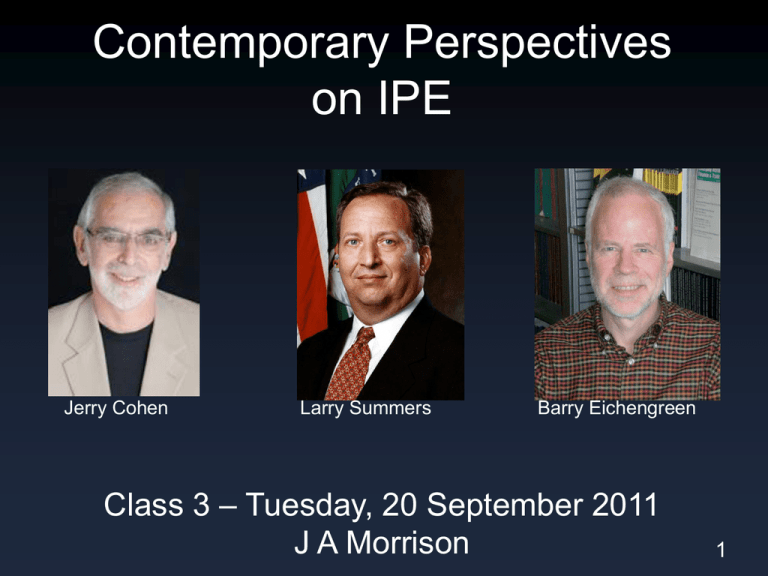
Contemporary Perspectives on IPE Jerry Cohen Larry Summers Barry Eichengreen Class 3 – Tuesday, 20 September 2011 J A Morrison 1 Contemporary Perspectives on IPE I. Defining Our Terms II. IPE as a Social Science III.IR “Schools”/“Theories” IV.Some Differentiating Questions V. Reference to Empirics VI.Conclusion: How should we study IPE? 2 Contemporary Perspectives on IPE I. Defining Our Terms II. IPE as a Social Science III.IR “Schools”/“Theories” IV.Some Differentiating Questions V. Reference to Empirics VI.Conclusion: How should we study IPE? 3 Socialism Autocracy Democracy Authoritarianism There are lots of “-isms” in the political economy literature… Capitalism Aristocracy Liberalism Communism 4 Since these terms are frequently used in different ways, it will be valuable for us to be sure we use the terms in the same ways in this class. 5 I like to think about them as describing points along various continua, as representing values for particular variables. 6 I understand these terms in the context of the following big questions… 7 Regime Type: Who holds the reigns of power? Democracy Many Aristocracy Few Autocracy One Negative Liberty: What restrictions are placed on government authority? Liberal Many Authoritarian None Political-Economic System: What is the level of government intervention in the economy? Capitalist/FreeMarket Low Socialist/Mana ged High “Communism,” for me, denotes the politicaleconomic system that Marx predicted would follow inevitably from capitalism. 11 Remember, these questions relate to variables. Over time, we have observed various combinations of these different values. 12 Observed Combinations Country Regime-Type Liberality PE System USSR (1945) Autocracy Authoritarian Socialist China (Today) Aristocracy Authoritarian Mixed/Middle US (Today) Democracy Liberal Capitalist Venezuela Democracy Authoritarian Socialist Sweden Democracy Liberal Socialist Iraq (2000) Autocracy Authoritarian Capitalist GB (1815) Aristocracy Liberal Managed Of course, we might disagree about specific characterizations; but the point remains: different regime types, levels of liberality, and PE systems have been combined. 13 Theory versus Policy • Foreign Economic Policy (“FEP”) – – – • The policies designed to influence the relationship between the domestic economy and foreign markets and/or the global economy These are the policies that exist, not necessarily the theories Broad category: everything from tariffs to fertility policy Political Economic System (e.g. Mercantilist System) – – The proposed bundle of related theories concerning a state’s FEP Note: the proposed system may not always be fully adopted or implemented in practice; the PE systems14 Contemporary Perspectives on IPE I. Defining Our Terms II. IPE as a Social Science III.IR “Schools”/“Theories” IV.Some Differentiating Questions V. Reference to Empirics VI.Conclusion: How should we study IPE? 15 There’s a real question about the extent to which we do and should study IPE as a science. 16 We’ll consider that question. But, first, let’s discuss what it means to study something “scientifically.” 17 Scientific study has several defining features. 18 Scientific study is positive. Concerned with what is (positive), not what ought to be (normative). 19 And scientific study relies on the empirical testing of models to explain the relationship between variables. 20 Let’s unpack that. 21 Variables • Variables: factors of interest that may vary in value • May be continuous, discrete, or a “dummy” • Examples – Volume of trade (continuous) – Type of Exchange Rate Regime (discrete) – Status of membership in Int’l Organization (dummy) 22 Theories and Models • Specify relationship between variables – Value of independent (or “explanatory”) variable explains dependent variable – E.g. Type of exchange rate regime (IV) explains the volume of trade (DV) • May be correct or incorrect (i.e. may or may not align with reality) • Endogenous: determined within the model • Exogenous: determined outside of the model 23 Facts • Descriptions of reality • For our purposes, statements about the value of variables • May be correct or incorrect • Examples: – Hong Kong has a fixed exchange rate (correct) – The volume of world trade has increased since 1945 (correct) – The United States has a fixed exchange rate regime (incorrect) 24 Empirical Tests • Theories/Models lead to testable hypotheses – E.g. Fixed exchange rate regimes lead to greater volumes of trade. • Hypotheses are predictions about the value of variables • We test hypotheses by comparing predictions to observed reality – Do we observe that countries with fixed exchange rate regimes have greater volumes of trade than countries with flexible exchange 25 Correlation ≠ Causation • Correlation: the values of two variables vary together – E.g. When many students arrive to class carrying umbrellas, overall attendance is poor • Spurious correlation: correlation without causality – E.g. students do not avoid class because they fear umbrellas! • Or causality may be reversed – E.g. Perhaps high trade volumes lead to fixed exchange rate regimes (rather than vice 26 Scientific study relies on an epistemology. An understanding of what can be known and how to acquire knowledge. 27 Contemporary Perspectives on IPE I. Defining Our Terms II. IPE as a Social Science III.IR “Schools”/“Theories” IV.Some Differentiating Questions V. Reference to Empirics VI.Conclusion: How should we study IPE? 28 You hear a lot about the “schools” of IR thought. Realism, Constructivism, Idealism, Liberalism, Institutionalism, &c. 29 These terms, used tout court, mean almost nothing to me. 30 There is simply too much variation within these “schools” for these monikers to convey much useful information. 31 Many of the “founders” of these schools (Wendt, Mearsheimer) don’t even agree on who belongs where, let alone what defines each school! 32 So, think in terms of either specific theorists and/or specific theories—meaning, responses to precise questions. 33 And think in terms of multiple dimensions— not just a simple, onedimensional continuum. (Don’t think the way my mother does: “liberals” versus “conservatives.”) 34 Contemporary Perspectives on IPE I. Defining Our Terms II. IPE as a Social Science III.IR “Schools”/“Theories” IV.Some Differentiating Questions V. Reference to Empirics VI.Conclusion: How should we study IPE? 35 Here are some of the essential questions we might ask. Each question constitutes a dimension along which we might organize different theorists & theories. 36 IV. DIFFERENTIATING QUESTIONS 1. 2. 3. 4. Where’s all the action? Does process matter? What makes us tick? What is the nature of our world? 37 The Levels (Images) of IP • At what level should we look for the key variables? • The Levels (Images) – Individual (1st): Hitler liked war – Unit/State (2nd): Germany was Autocratic; Autocracies are bellicose – System (3rd): There wasn’t a hegemon (single dominant power) to check Germany’s rise 38 The Primary Actors in IP • Who are the primary actors in IP? What ought to be our “units of analysis”? • Potential Units of Analysis – States – Individuals – International Institutions & Organizations – Interest Groups and NGOs – Socio-Economic Classes – Transnational Social Movements (e.g. Feminism, Environmentalism, &c) 39 The Types of Variables • What types of variables matter? • Material Factors – Power – Wealth – Geography – Material interests (income, &c) • Ideational Factors – Values – Perceptions & Understandings – Assumptions, Expectations, & Identities 40 IV. DIFFERENTIATING QUESTIONS 1. 2. – – Where’s all the action? Does process matter? What makes us tick? What is the nature of our world? 41 Static versus Dynamic Models • Static Models – “Snapshot” of current situation – History, momentum, &c., do not matter – Many variables treated as exogenous • Dynamic Models – Process matters – Virtually all variables could be endogenous – E.g. The economic situation Obama faces must be understood in the context of previous administrations 42 Why use static models at all? parsimony—dynamic models are quite unwieldy. – E.g. Did Andrew Jackson’s administration help to generate the current financial crisis? - The question: which variables can we assume to be exogenously determined? - Disagreement arises over answers 43 IV. DIFFERENTIATING QUESTIONS 1. 2. 3. – Where’s all the action? Does process matter? What makes us tick? What is the nature of our world? 44 Logics of Human Behavior • Consequentialist (Functionalist) – Actions chosen based on expected consequences • Appropriateness (Normative) – Actions chosen based on normative standards of right & wrong Which mode did Locke, Smith, & Marx use? 45 Narrowness of Our Interests • Egoism – Almost total emphasis on one’s own welfare • Altruism – Considerable weight given to the welfare of others Which view did Locke, Smith, & Marx hold? 46 Source of Our Interests • Rationalism – Preferences are exogenously determined • Constructivism – Preferences are endogenous to interaction Are we social or unitary/atomistic actors? 47 IV. DIFFERENTIATING QUESTIONS 1. 2. 3. 4. Where’s all the action? Does process matter? What makes us tick? What is the nature of our world? 48 Do Markets Work? • Market Failure – Without active management, markets often produce suboptimal outcomes • Invisible Hand – Markets produce best outcomes when intervention is minimized (laissez-faire) 49 Compatibility of Interests • Mutual Benefit – Pursuit of private interest serves public good – “Private vices are public benefits” (Mandeville) – E.g. Competition between producers better products at lower prices • Zero-Sum – Benefits can only come at others’ expense – E.g. Allocation of rival goods; pursuit of status What areas of the market face which circumstance? 50 So… There are a lot of different questions to consider; and there are a lot of different ways to group scholars and approaches to IPE. 51 Contemporary Perspectives on IPE I. Defining Our Terms II. IPE as a Social Science III.IR “Schools”/“Theories” IV.Some Differentiating Questions V. Reference to Empirics VI.Conclusion: How should we study IPE? 52 Remember that our theories specify the relationship between variables. We test our theories using empirical evidence. 53 Throughout the term, we’ll rigorously examine a range of empirical cases. This will help you to build a universe of cases upon which you can draw as you attempt to develop and test theories about IPE. 54 I’m going to talk a lot about the “Anglosphere”—the Englishspeaking part of the world. Here’s why… 55 Why focus on the Anglosphere? 1. Important – Historical influence of British state and empire – Influence of British thinkers – Familiar case in the literature • Accessible – Writing is in English – Rich array of sources, perspectives on context, &c. – This is the case I know best! 56 Some of this you will have to know because that history was influential. But in this class—and every other—you should evaluate theory using the cases you know best. Combine what we study here with 57 what you already know. Contemporary Perspectives on IPE I. Defining Our Terms II. IPE as a Social Science III.IR “Schools”/“Theories” IV.Some Differentiating Questions V. Reference to Empirics VI.Conclusion: How should we study IPE? 58 Today, I’ve tried to briefly introduce some of the major issues and perspectives in the study of IPE today. I want to emphasize, though, that there continues to be disagreement about how (and what!) we should study in this field. 59 (Think: Cohen on the British & American Schools; Eichengreen on Economics versus IR) 60 What should the study of IPE look like? 61 Should we consider normative questions? Or just positive ones? 62 How scientific should our inquiry be? How rigorous should our empirical standards be? Should we only formulate refutable hypotheses? 63 Whom should we study? How much emphasis should we place on the state (versus individuals, NGOs, MNCs, &c)? 64 We’ll continue to engage these questions throughout the term… 65
